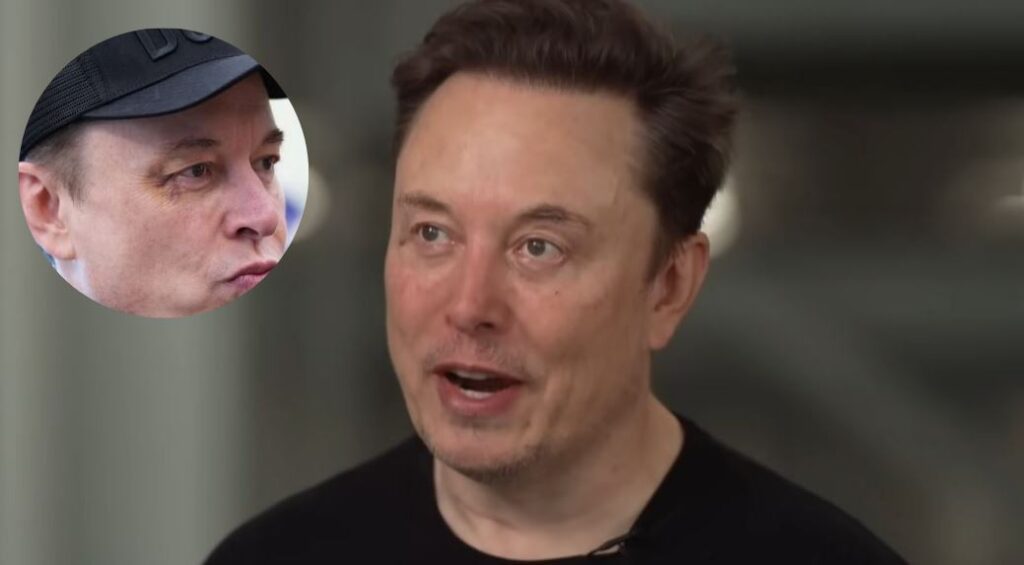
The purpose of Elon Musk’s exit press conference from the Oval Office was to formally bid adieu to his brief tenure as head of the Department of Government Efficiency. Rather, it sparked a stir on the internet with a different headline: a bruise around his right eye that was strikingly visible in the camera flash. Musk, who was wearing a black T-shirt and a cap with the DOGE logo, shrugged and grinned when asked. In reference to his 5-year-old son X, he recalled, “I told you to go ahead and punch me in the face.” “And he did.”
By Musk’s standards, the moment was definitely out of the ordinary. A noticeable bruise at a White House press event wasn’t just an aesthetic oddity; it was an immediate cultural flashpoint for someone who is known for making casual tweets that influence markets around the world. Images were all over Reddit and Twitter in a matter of minutes. Theories of conspiracy flourished. Was the filler procedure unsuccessful? Was there a brawl? Was it business conflicts or stress from his recent legal scrutiny? As usual, Musk responded casually but sharply, joking that he was “nowhere near France” in reference to the Macron viral video that was going viral.
Elon Musk: Personal and Professional Profile
| Attribute | Details |
|---|---|
| Full Name | Elon Reeve Musk |
| Date of Birth | June 28, 1971 |
| Age | 53 |
| Nationality | South African, Canadian, American |
| Occupation | Entrepreneur, Engineer, Investor |
| Known For | CEO of Tesla and SpaceX; Founder of Neuralink and The Boring Company |
| Children | At least 12, including X Æ A-Xii with musician Grimes |
| Recent Role | Head of the Department of Government Efficiency (DOGE) under President Trump |
| Tenure at DOGE | 130 days |
| Notable Appearance | Oval Office press conference on May 30, 2025, with a visible black eye |
Media outlets swiftly disseminated his explanation, which was that “Lil X” had punched him during some harmless roughhousing. Despite its briefness, the story provided a surprisingly relatable glimpse into Musk’s complex personality: a tech tycoon with over ten kids, a fondness for memes, and a parenting approach that combines performative eccentricity and laissez-faire.
The incident raises more general questions about how public personalities rewrite stories by using intimate moments. In addition to becoming a tabloid headline, Musk’s black eye served as a diversion from more important issues. Musk did not confirm or deny the allegations made in an investigative article published by The New York Times just hours prior to the press conference, which claimed that Musk regularly used Adderall, ecstasy, and ketamine. He decided to reroute instead, humanizing himself with the “punch” story.
The Musk-X moment reads as both real and dramatic in a time when politics frequently prioritizes appearances over substance. Standing next to Musk, Donald Trump continued, “X could do it, if you knew X,” further solidifying Musk’s reputation as a tech whiz and a spoilt dad. Whether planned or unplanned, the moment turned into a potent distraction.
The practice of celebrity parenting has long been criticized. Conversations about parental influence, boundaries, and the costs of public life have been sparked by Brad Pitt’s custody disputes, Beyoncé and Jay-Z’s stringent privacy policies, and even Prince Harry’s remarks about raising kids in the spotlight. But Musk has a different approach to exposure. At campaign rallies, in Tesla factories, and even on his shoulders during official briefings, his son X has made appearances. There is a pattern to the black eye moment: it blurs the lines between eccentricity and ethics by fusing the personal and promotional.
X’s mother, Claire Boucher, also known professionally as Grimes, has said little about the situation. Followers are still perplexed by their co-parenting arrangement, which is frequently characterized as flexible and unconventional. Musk takes a very unusual approach to fatherhood, having at least a dozen children from various relationships, some of whom were born through surrogacy. Another layer is added by this most recent incident, which demonstrates the open, even anarchic, parenting style that is consistent with his unruly public persona.
Critics, meanwhile, wondered if the bruise might conceal something more sinister. Online speculative activity ranged from self-inflicted distraction to accident. Some viewed it as a curiously timed stunt, appearing on the same day as a drug-related exposé, in an era where image management was the norm. Although this theory is unsupported by evidence, it highlights the extent to which public confidence in tech titans has eroded. Even seemingly innocent moments seem staged when billionaires embrace performative transparency.
Notably, Musk’s departure from DOGE coincides with growing legal opposition to the federal cost-cutting initiatives implemented by the department. His vigorous efforts to cut bureaucracy resulted in thousands of layoffs and legal challenges to the validity of his directives. In contrast, the sight of a bruised face might seem insignificant, but it completely changed the news cycle. The purported poor management of DOGE and the global ramifications of dismantling the U.S. Agency for International Development received very few headlines. Instead, “Musk Black Eye Son” was Googled.
Seldom has the relationship between fatherhood, politics, and tech leadership been so widely visible. Only recently, through Meta’s AI-parenting initiative, has Mark Zuckerberg, who is renowned for being protective of his daughters, shared more about his family life. Tim Cook is still very private and childless. Even though he is sometimes pictured with his fiancée Lauren Sánchez, Jeff Bezos completely avoids being photographed. But Musk embraces it—sharing videos of X using a flamethrower, tweeting baby names, and now presenting a black eye as evidence of paternal bonding.
Is that careless? Or simply contemporary branding? Such moments, according to Musk’s supporters, humanize him and show that he is still rooted in everyday pleasures despite his wealth and fame. Critics have a different perspective, arguing that Musk blurs the distinction between showman and CEO, particularly when using personal tales as a means of evading corporate responsibility.
The story has peculiar social resonances. Online, parents argued over whether it was acceptable to allow a child to punch an adult, even in jest. According to pediatricians, such behavior could serve as a model for aggressive behavior. Others, however, viewed it as innocuous and symbolic—a unique tender moment for a man who is frequently chastised for being cold and impersonal.
In the end, the episode shows how Elon Musk still controls the conversation—not necessarily by inventing or innovating, but by controlling the narrative. Whether intentional or unintentional, his black eye served as a lesson in celebrity fatigue, parental spectacle, and media manipulation.
